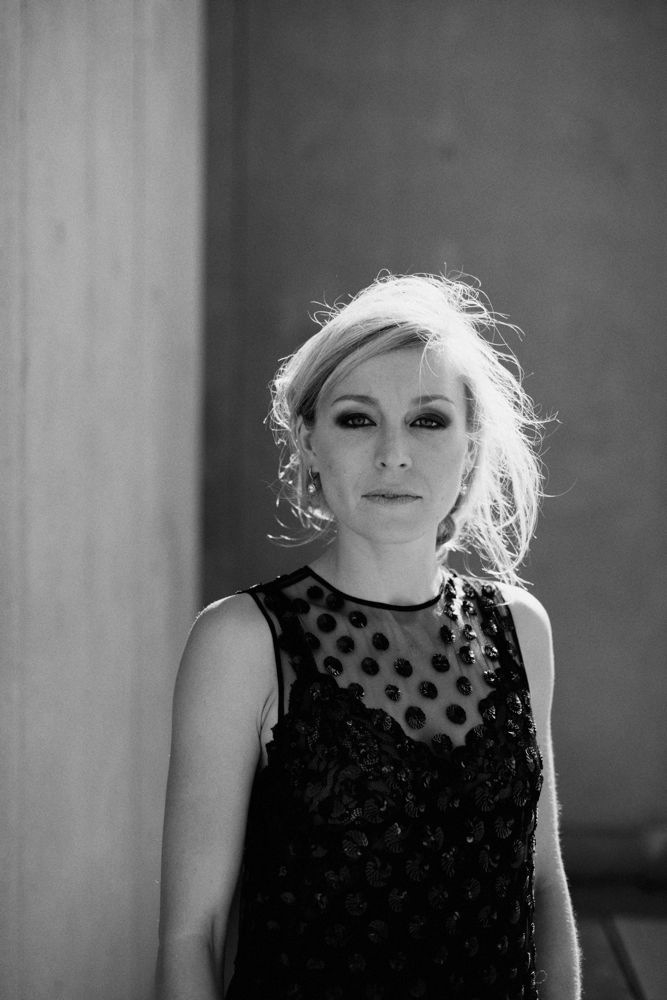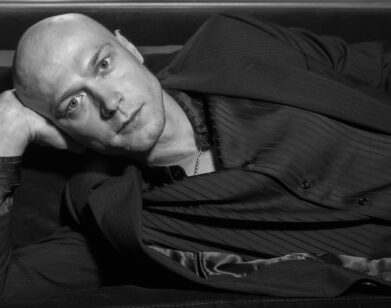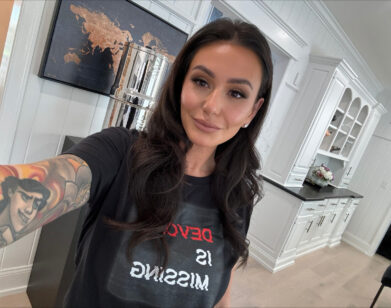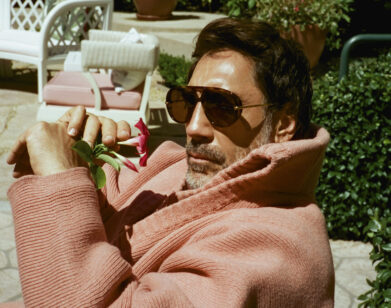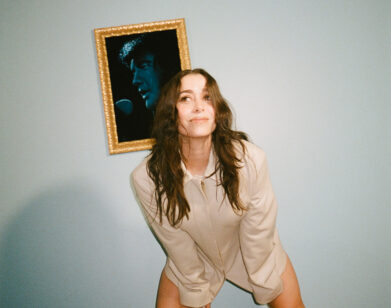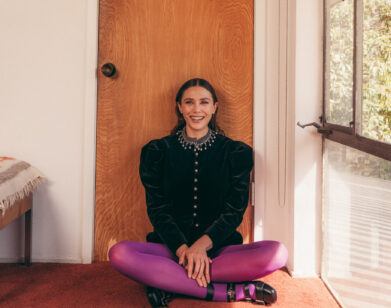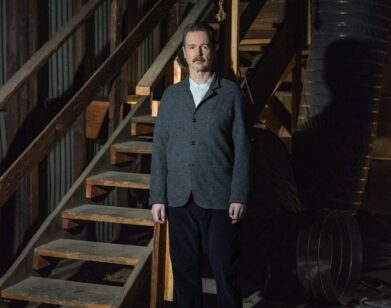Juliet Rylance
ABOVE: JULIET RYLANCE IN NEW YORK, SEPTEMBER 2014. PHOTOS: SHAWN BRACKBILL. STYLING: JESSI JACQ. MAKEUP: CAROLINA DALI USING CHANEL FOR SEE MANAGEMENT. HAIR: LAURA DELEON FOR JOE MANAGEMENT.
Set in downtown New York’s Knickerbocker hospital at the turn of the 20th Century, The Knick is gripping and grisly. Steven Soderbergh, who directs and edits the show, does not shy away from some of the more gruesome aspects of medicine in the 1900s: doctors shoot up cocaine in between surgeries and try to forget about bloody C-sections gone awry with opium, prostitutes, and bar brawls; patients succumb to meningitis and typhoid (caught directly from Typhoid Mary, no less), lose body parts to syphilis, and have their teeth extracted to help cure them of mental illness; ambulance workers pull out wooden clubs to fight their counterparts from other hospitals for wealthy potential patients; and nuns perform illegal abortions. There are immigrant tensions, gangs, and race riots, and medical advances such as the introduction of the X-Ray machine.
What elevates The Knick to the upper echelons of entertainment, however, is the characters – there are many of them, and each one is interesting. There are the stars: Clive Owen as the brilliant and arrogant chief of surgery Dr. John Thackery; André Holland as the hospital’s first non-white doctor, Dr. Algernon Edwards, who is just as intelligent as Thackery and frustrated by the hoops he must jump through to have his ideas implemented. Juliet Rylance plays Cornelia Robertson, a wealthy woman ahead of her time whose father is a major donor to the hospital. Eve Hewson is Nurse Lucy Elkins, a Southern girl with more mettle than you might think. Jeremy Bobb plays Herman Barrow, the rather odious hospital administrator. But the depth extends beyond the main cast—you don’t just want to know about Michael Angarano’s character Bertie, a young doctor who idolizes Thackery and trails hopefully after Lucy, you want to know about his father who is both disapproving and always present for his son. Or Cornelia’s father and brother, who are perhaps not in the comfortable position they project. Or Sister Harriet, the Irish nun with some interesting loopholes in her faith. Or Tom Cleary, one of the aforementioned ambulance men with an unexpected touch of compassion. “I love the pace of the show,” says Juliet Rylance. “It’s courage in taking the time to allow the audience to get to know these characters and the period and, once established, picking up the pace and hurtling towards the finish line.
Rylance is particularly wonderful in her role as Cornelia. “She is beautifully complex,” Rylance explains. “Her outward face is that of a strong determined woman in charge of her life, crusading for equality, but inwardly she’s a women fighting to be seen. She falls in love and is struggling to have a career and fight for her own dignity and respect.”
If people are unfamiliar with Rylance, it is only because she has spent most of her career onstage (she’s won an Obie award and was nominated for a Lucille Lortel award for her performances in Off-Broadway productions of As You Like It and Othello). Born into a family of artists (her mother is a composer, her father an architect, and her stepfather the revered British actor Mark Rylance), Rylance studied drama at RADA and splits her time between London, Joshua Tree, and New York. When we meet in New York, she had just premiered her new film Days and Nights at the IFC Center and is about to go to Joshua Tree for a week of tree-planting. The directorial debut of her husband Christian Camargo, Days and Nights stars Katie Holmes, Cherry Jones, William Hurt, Ben Whishaw, Mark Rylance, Jean Reno, and Allison Janney. Both Juliet and Camargo act in the film, and Juliet also served as a producer.
EMMA BROWN: How was your premiere last night?
JULIET RYLANCE: It was a wild night; I couldn’t believe how many friends showed up. Steven Soderbergh laid on his special Singani 63 drink at the after party, which is amazing.
BROWN: You mentioned Days and Nights is based on Chekhov’s play The Seagull—how so?
RYLANCE: It follows a family over the course of a Memorial Day weekend and beyond as they grapple with themselves and each other. It’s a haunting, absurdist, and heartbreaking film. It isn’t a direct adaptation, rather an intimate and deeply personal film —a meditation on the themes of family and country, selfish and selfless love, and the responsibility we have to each other and the world we inhabit. Christian assembled a phenomenal cast. I play Eva, the “Nina” character of Chekhov’s play. Like the original story, she is the catalyst for the drama that unfolds. It’s playing here at the IFC Center in New York.
BROWN: Wonderful. I’m obsessed with The Knick. How did you first get involved in the show?
RYLANCE: I read the script and I was blown away by the pilot—how detailed everything was, how researched everything was. I had an overwhelming desire to play Cornelia. I sent in a tape and I think a day or two days later, I got a phone call from my agent saying Steven wanted to meet with me. We met at a hotel bar and chatted about everything other than The Knick. At the end of the meeting he said, “I’ve actually got the whole producing team around the corner and the writers.” They all came out and we had a lot of fun. Then my agent called and said I had the job.
BROWN: I’ve talked to some other people involved in the show—Greg Jacobs and Tom Lipinski—it seems like you have a really nice group of people.
RYLANCE: It’s not just a nice group, it’s an incredible group. Everybody’s so excellent at what they do and brilliant to be around. I can’t believe the cast came and supported the film last night—it’s above and beyond what companies normally do.
BROWN: I heard that you are all coming back to New York to film the second season in the Spring.
RYLANCE: We are. We start filming in February. I think they’ve condensed the schedule to three months. For the first season, we shot all 10 episode over five months, and Steven was directing, DP-ing, and editing every single episode. This is going to be a huge challenge because we’re doing it in even less time, but I think everyone’s really fired up and excited.
BROWN: When you agreed to play Cornelia, did you know what was going to happen over all 10 episodes?
RYLANCE: I didn’t. I had the pilot and I had an idea from Steven and that was it. As soon as I accepted the job I got sent all 10 episodes. Then I realized we had to learn all 10 episodes because of the way that we were filming. We were carrying 10 episodes of dialogue in our heads most of the time, which was a little bit of a mind-melt but great. [laughs]
BROWN: What was your filming schedule?
RYLANCE: Normally, a TV show shoots episodically. We didn’t have the time or the money to shoot like that; Steven made the economical decision to shoot the series as if we were making a 10-hour film so we’d shoot by location. Everything that happened in Cornelia’s family house, we would shoot all over one week or a couple of days, all out of sequence. In a day we might shoot a scene from Episode 10, then Episode Eight, then back to Episode Four. It was intense holding such large character arcs in our heads for five months, but exhilarating. You really had to be on top of your lines and have done your homework. Luckily, a lot of my scenes are with André [Holland], and André is such a joy to work with. We spent a lot of time lugging around—well, actually André spent a lot of time lugging up huge scripts to my apartment. We all made these big white boards at home—we didn’t realize that everybody was doing it. We’d mark out every single scene and sequence and cross them off as we got through them and make notes about how we felt at the end of the scene or how the character felt, so we could remember this huge kind of map of the world.
BROWN: When did you discover that everyone was making the same sort of board?
RYLANCE: I think the first week Clive and I met up, and went, “How the hell are we going to do this?” [laughs] We all came down to his and just read through the first episode. He had a white board on his wall and I was like, “That’s what I’ve been doing!” Then we discovered that André was doing it and so gradually the word spread. I think Jeremy Bobb was the only actor that decided to make a script only of his scenes. We were all lugging around these big scripts and Jeremy Bobb had one condensed script just of his scenes, which Steven mocked him for heavily. [laughs]
BROWN: When did you decide you wanted to become an actress? Your stepdad is a very well respected actor, did you develop an interest in acting from observing his career?
RYLANCE: I’ve always wanted to act, even before Mark became my stepfather. I come from a family rooted in the arts so I think I naturally gravitated towards performing from an early age. I think I was about seven when people started telling my parents I would be an actor or a performer of some kind. Then I got a little scared when I finished school and thought I’d never be able to do it. Watching my stepfather and mother working in the industry—acting and composing—and seeing firsthand how difficult it is to achieve a successful career in the theater, I thought it might be safer to go to art school with the aim of becoming a painter. I was there for about three months and finally my boyfriend said, “Can you just audition for RADA and if you get it, be an actor and if you don’t, then fine?” So I plucked up the courage and auditioned and got in.
BROWN: I love that you picked becoming an artist as an easier career.
RYLANCE: [laughs] I know, it’s not at all! It’s even harder. I just thought it’s something that I love and I had a distinction in art at A-level and I still love painting. It seemed like a good idea, but three months in, I would come home crying everyday.
BROWN: Did you ever have a day job?
RYLANCE: In my gap year between college and drama school, I taught art at a hospice, and worked at a little coffee shop across the street from Shakespeare’s Globe Theatre in London when everything around it was still a construction zone. During the interval, 1,400 people would flock over and I would have to try to serve them all a cup of tea or coffee in under 20 minutes—I loved that job! It was called Cafe Storm, there were three of us working there. It’s since been replaced by a Starbucks. During my first year of drama school I lived in Soho and managed a Sicilian restaurant that would turn into a late night drinker after hours. It was a wild place—dancing on the tables, crates of grappa, policemen and Maltese Mafia drinking together and playing poker. A true character study in people from all walks of life.
BROWN: What was your first paid job as an actor?
RYLANCE: My first paying job was a in a production of Neil LaBute’s Bash: Latter Day Plays at the Union Street theater in Borough. I played the “Medea Redux” character. That was my first job out of drama school. I can’t remember how much I got paid. I’m sure it was pennies.
BROWN: How did you become involved in producing?
RYLANCE: I began producing alongside acting sort of by chance. I was lucky enough to do my work experience with West End producer Greg Ripley-Duggan, which was a seminal experience for me. The first thing that I produced was Bash, which I did again on the West End—it was the West End premiere of the play. I ended up calling up Neil—someone gave me his cellphone number. He flew to London and gave me the rights and said, “Call me if you have any questions about the play. I’m here.” I was blown away by how supportive he was. There are few people in the industry that are like that, that are mentors and guides, and that’s so important to an up-and coming-artist.
Producing is a wonderful foil to being an actor: acting being largely about getting out of my head, being present, a little irresponsible, whilst producing is the polar opposite. You need other players to act, you can’t act in a void, but producing is about making something out of nothing—conjuring a thought or an idea into reality.
SEASON ONE OF THE KNICK AIRS SUNDAYS ON CINEMAX. DAYS AND NIGHTS IS CURRENTLY AVAILABLE ON VOD.

